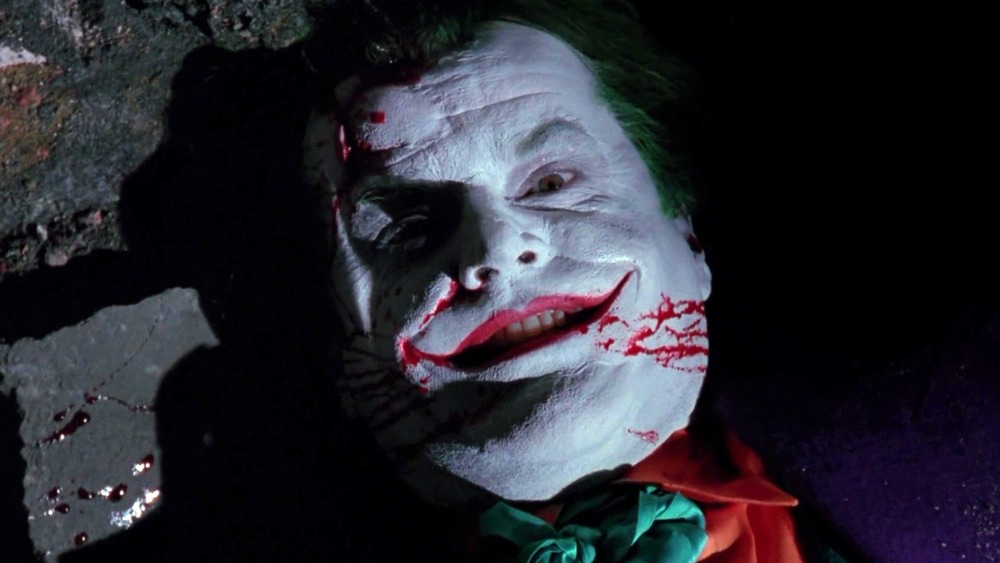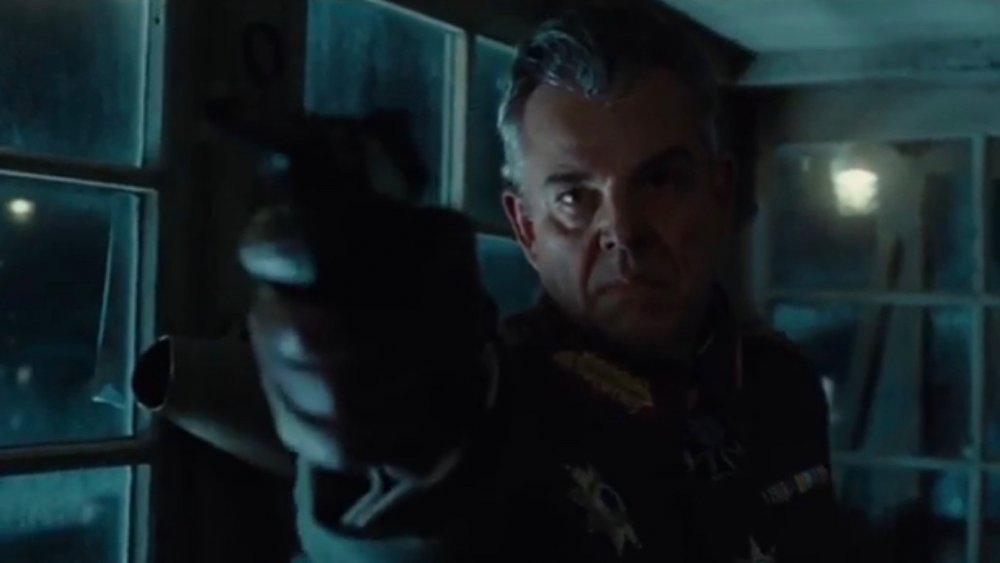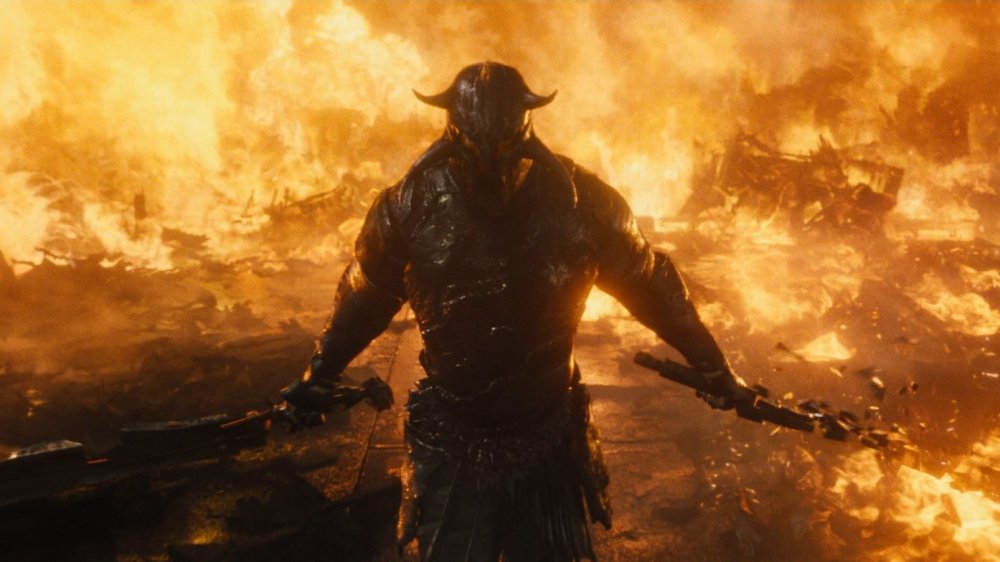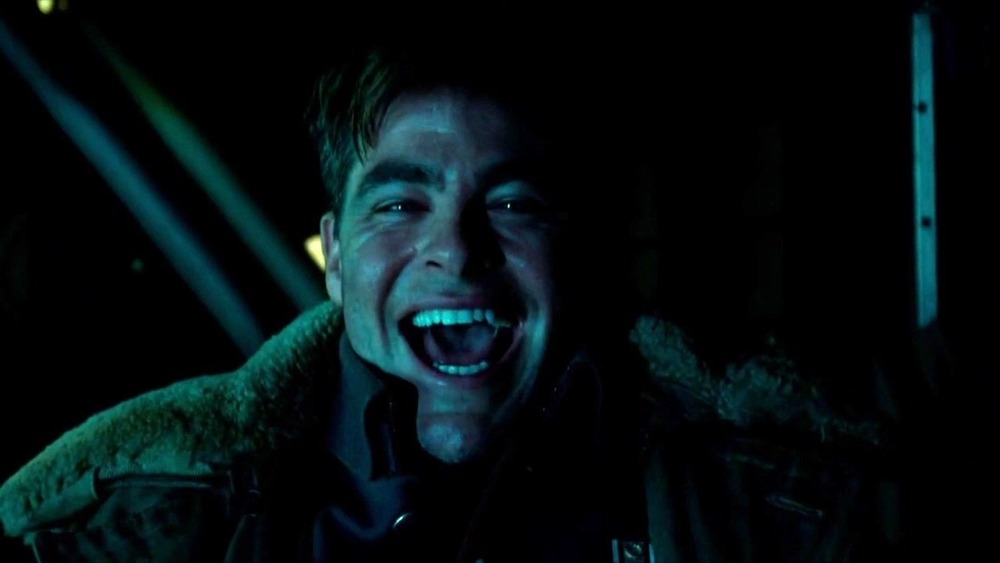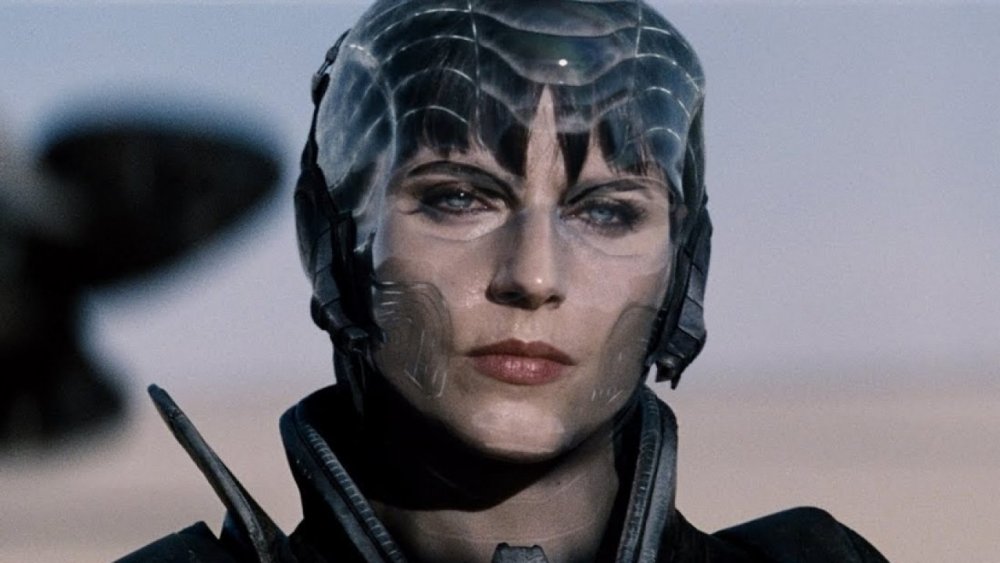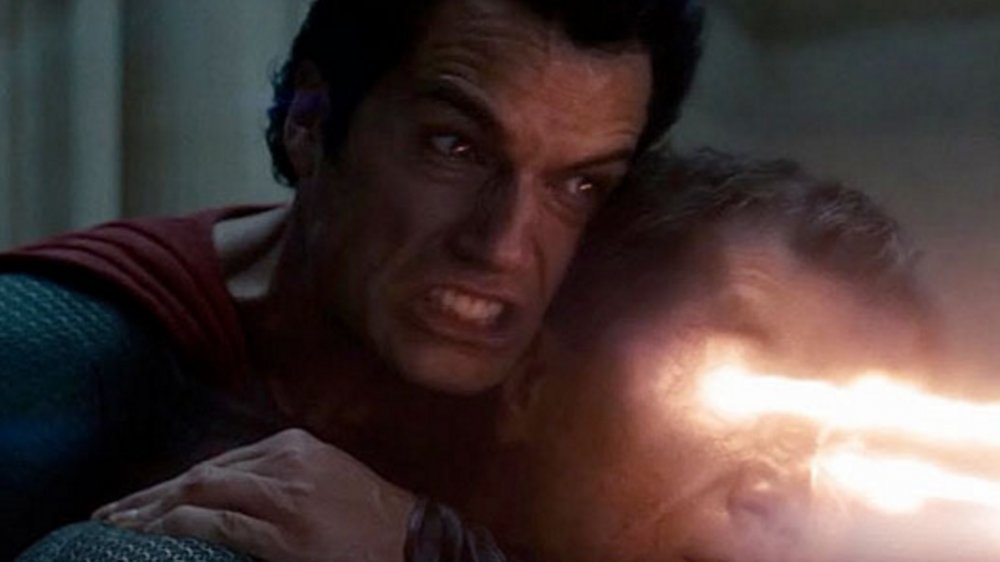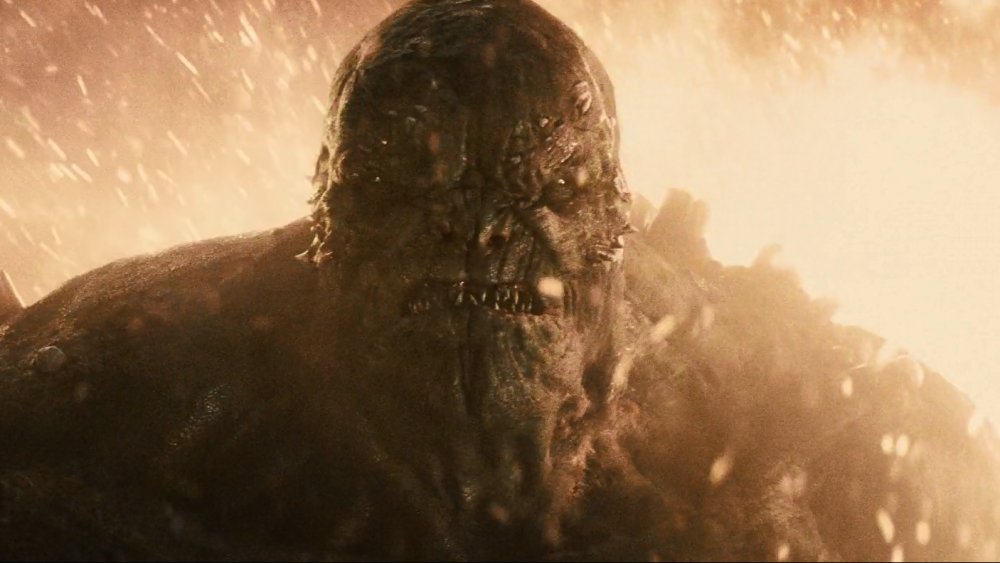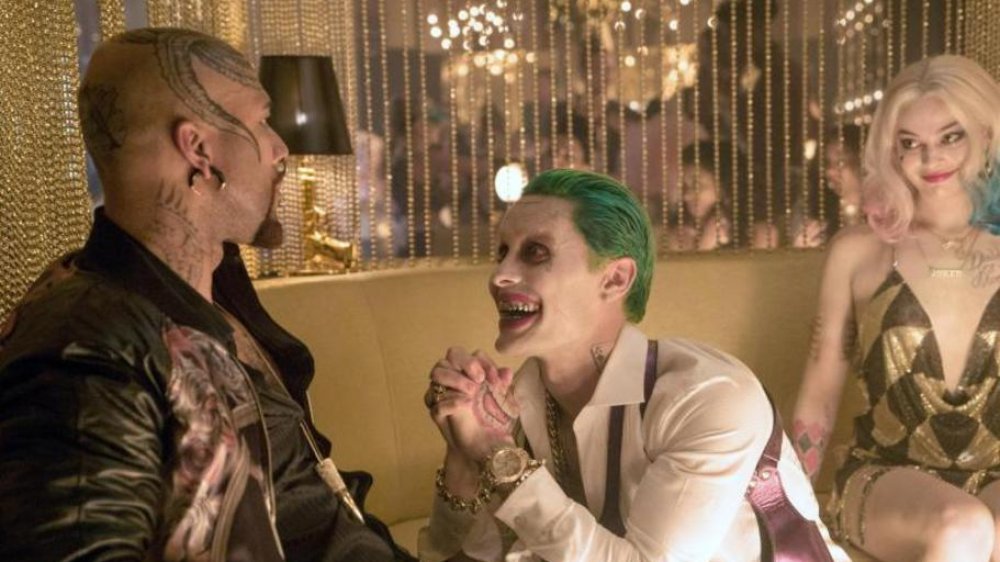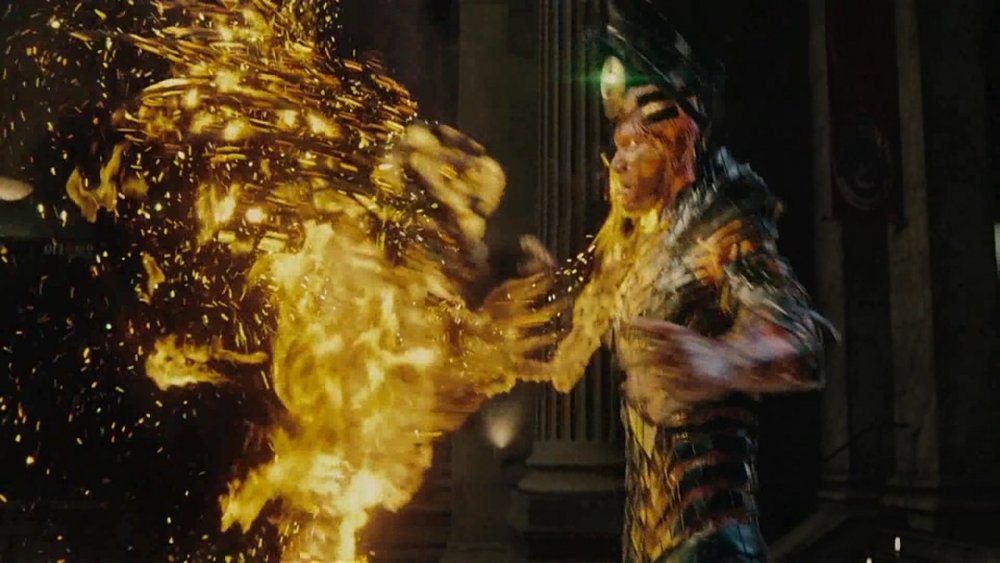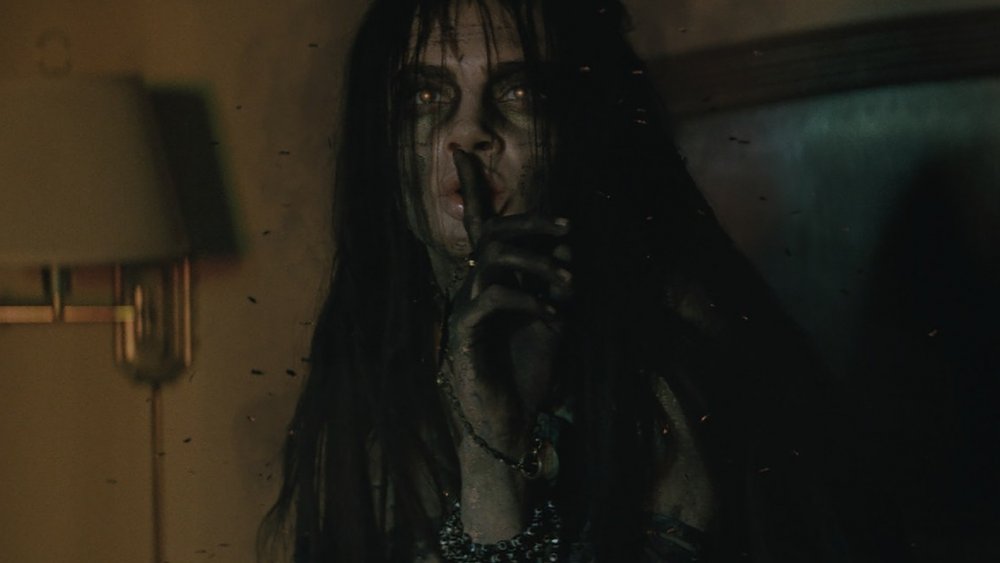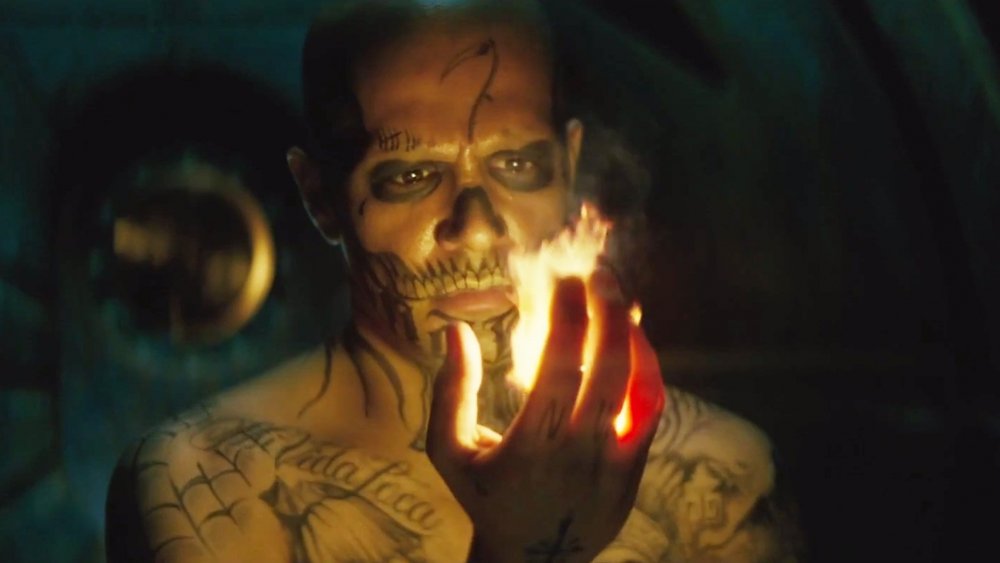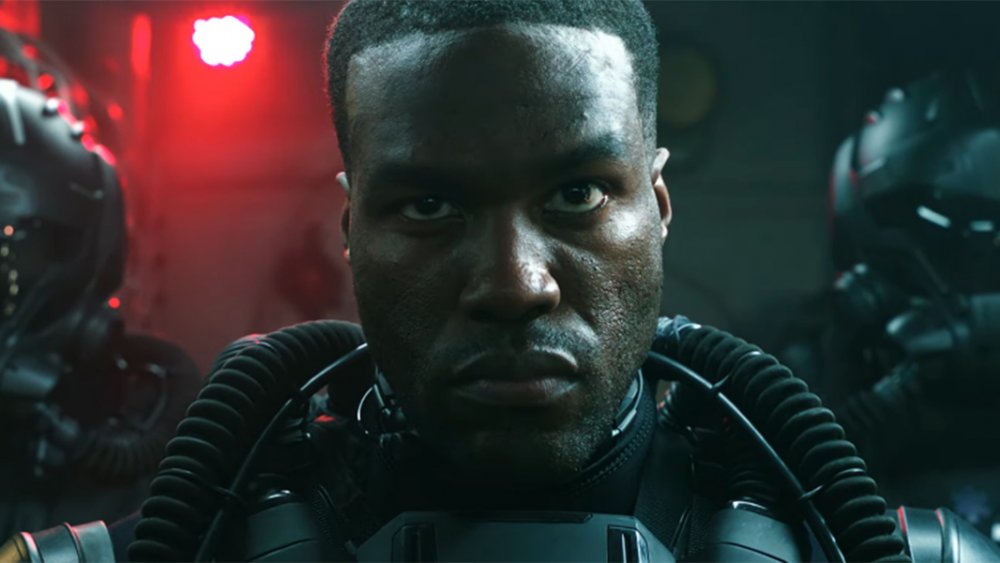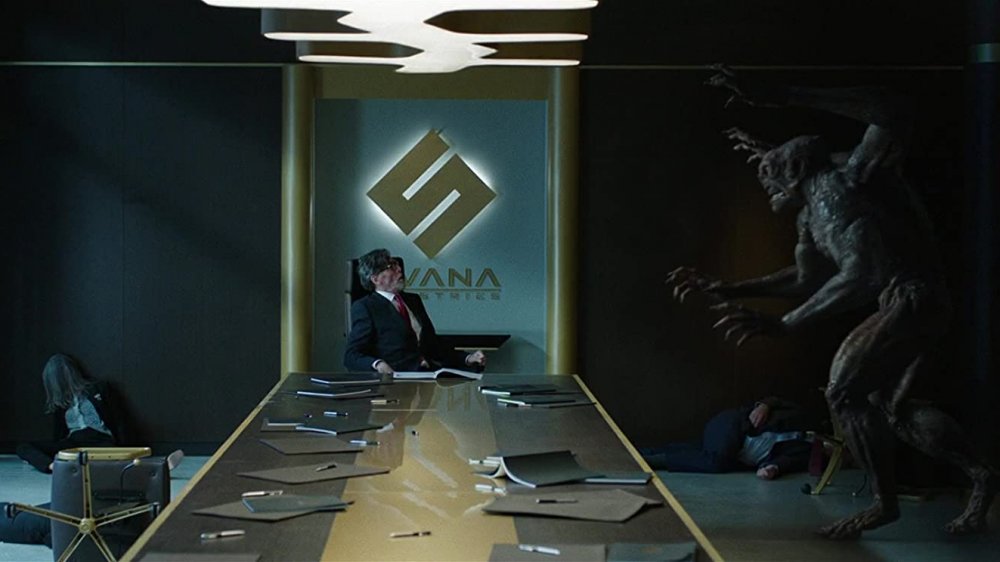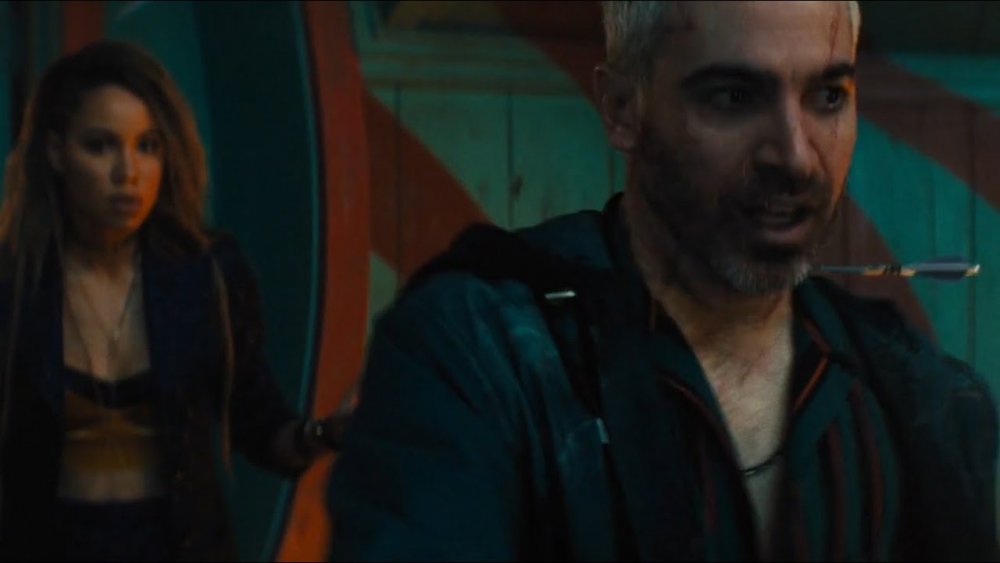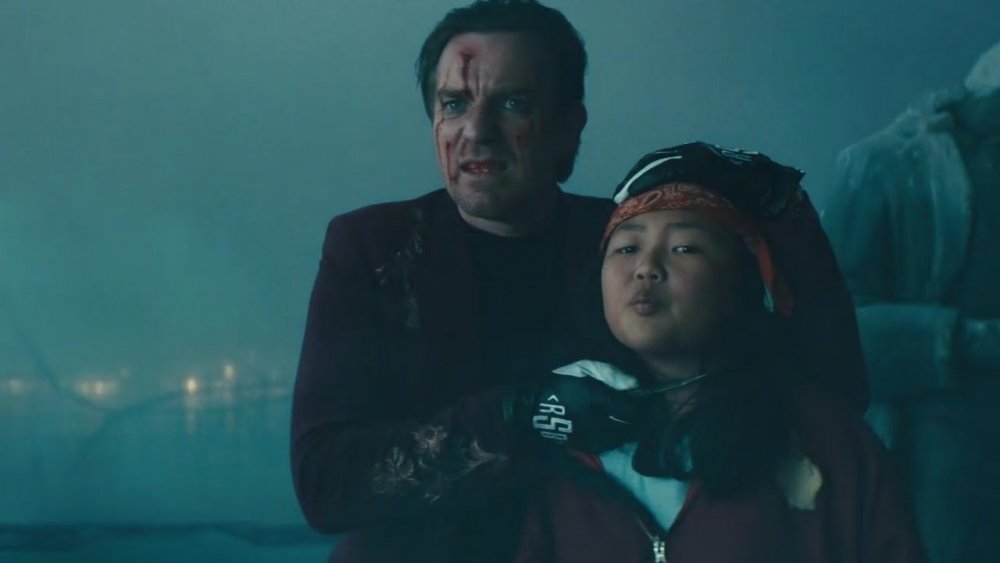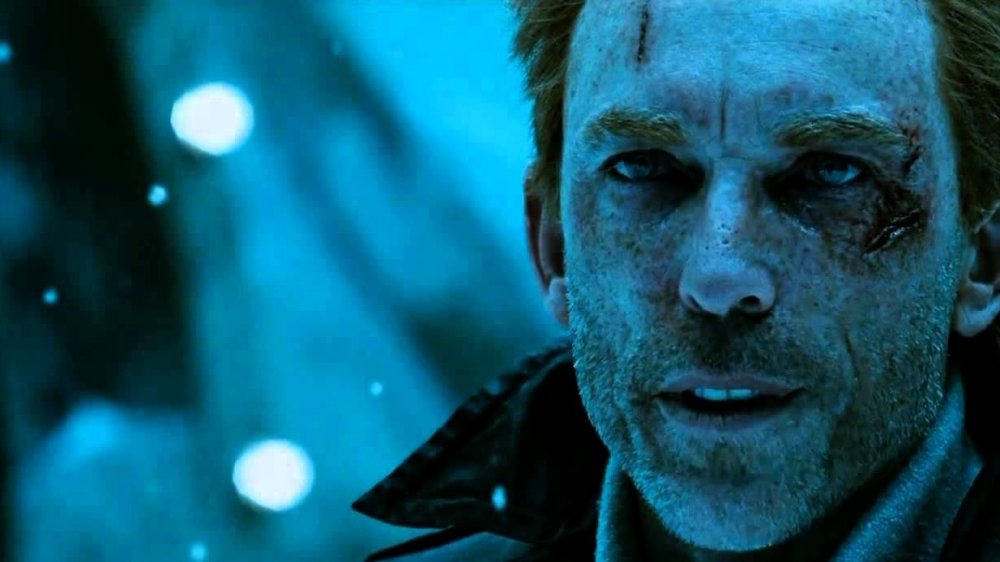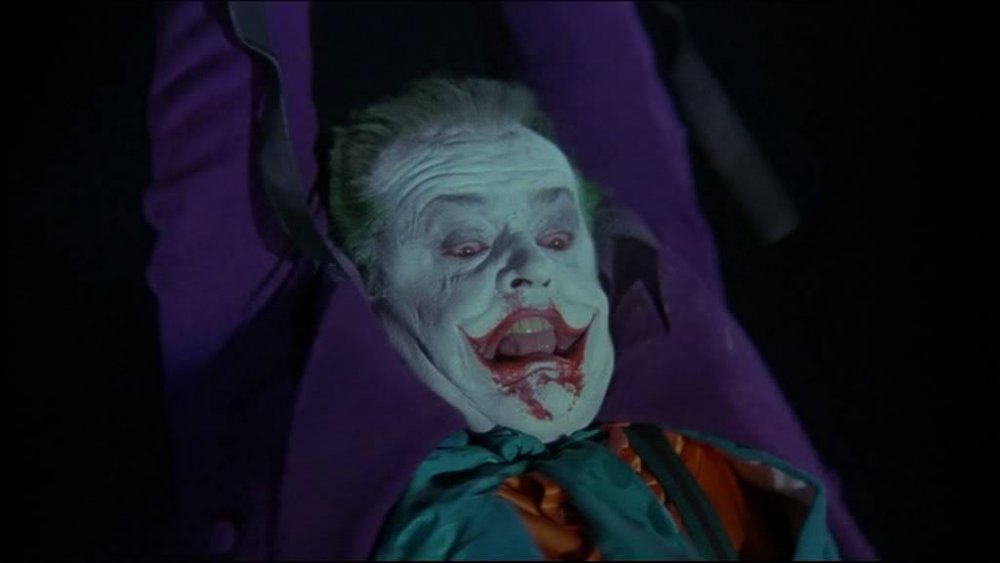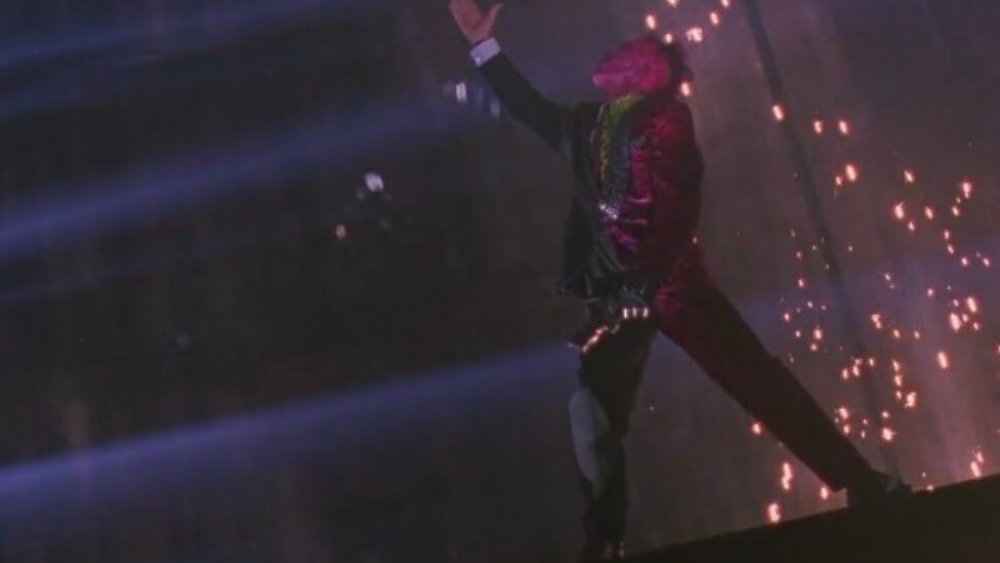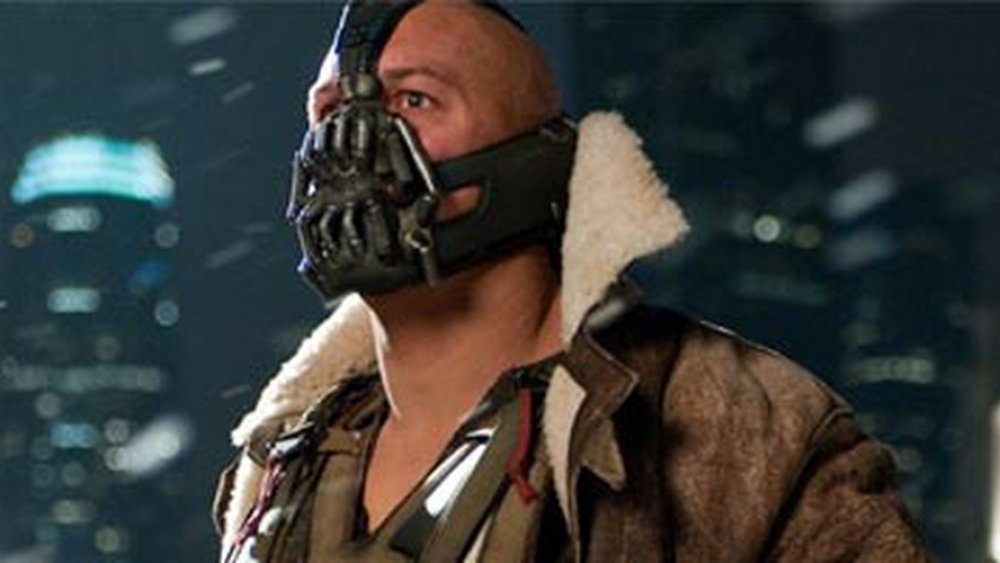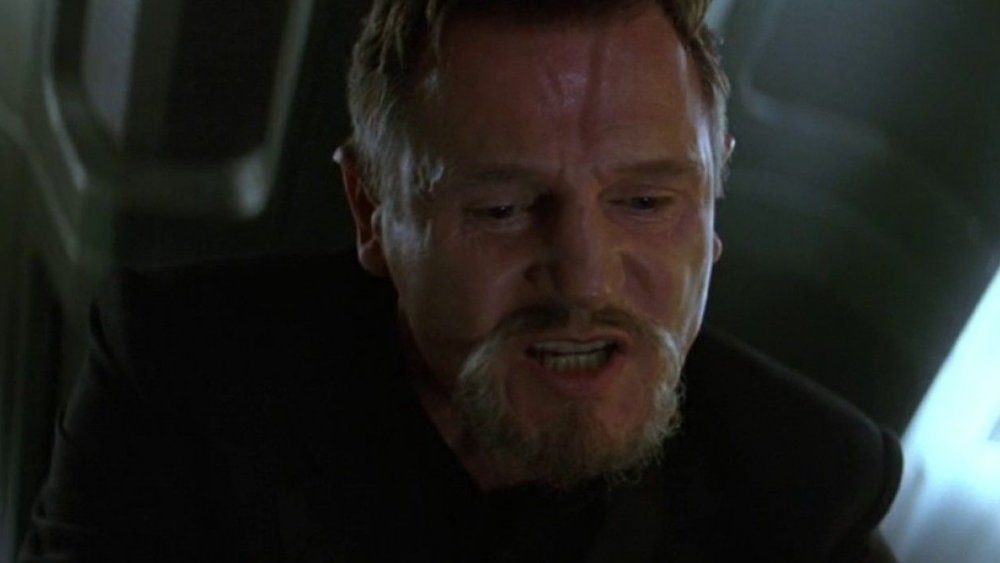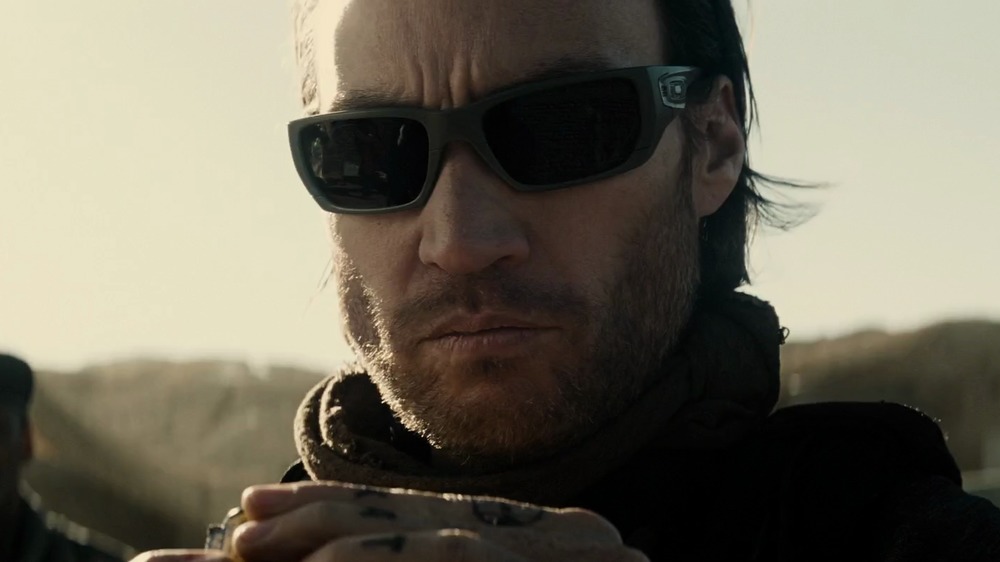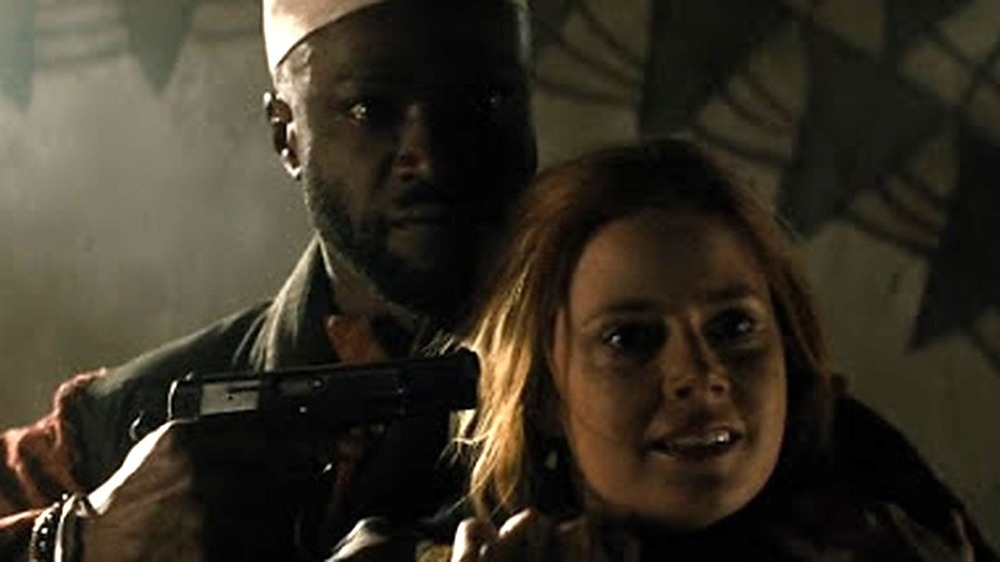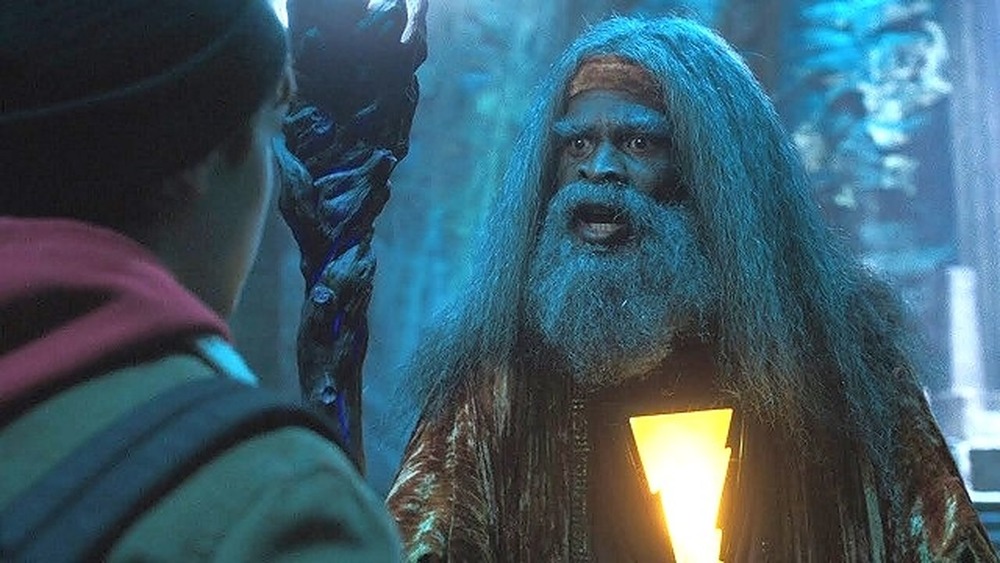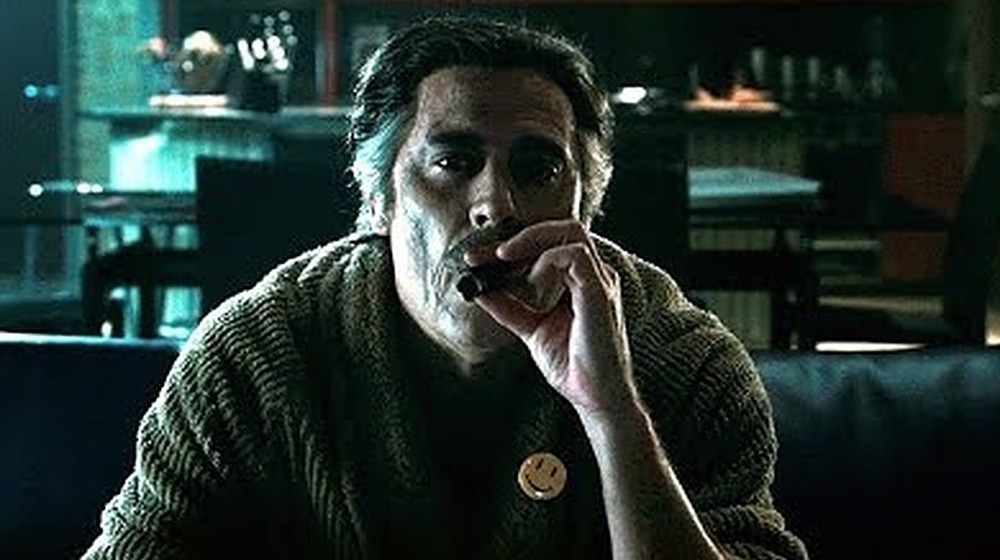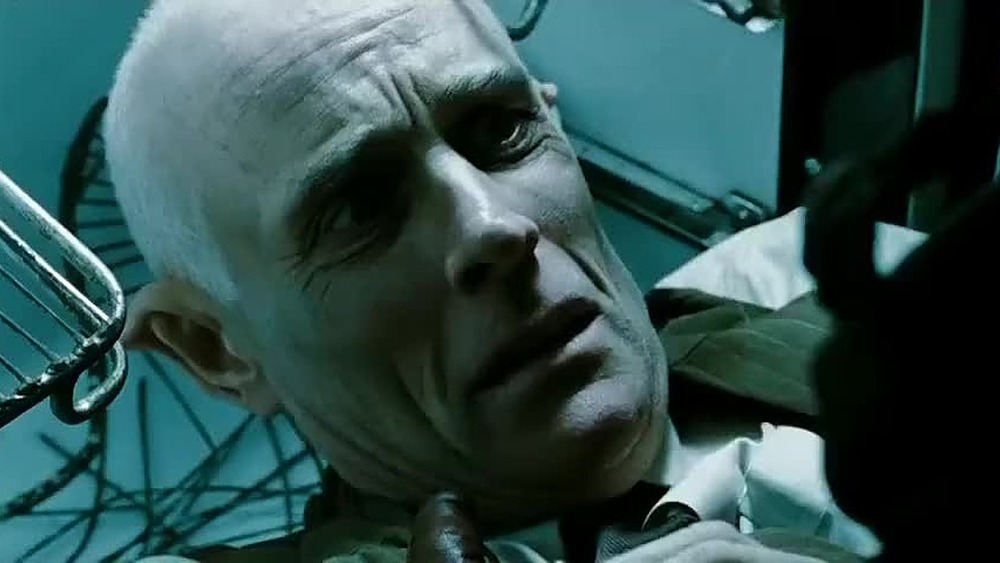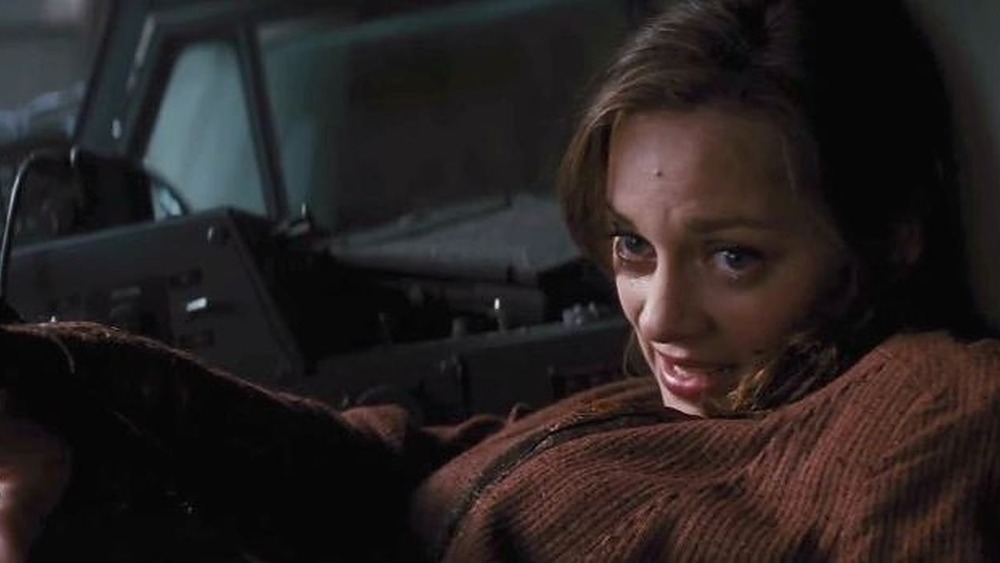The Last Words Of Every Fallen DC Movie Hero And Villain
The DC universe can be a dark place. Batman's crusade for justice is catalyzed by his parents' demise. Superman arrives on Earth because his entire planet explodes. Martian Manhunter flees to Earth as one of the last survivors of a civil war. The greatness of DC heroes lies in their tireless fight against this sort of injustice and misery: These crusaders struggle to end the endemic evils of society as readily as they face the darkness within themselves. Even DC's villains struggle to do what's right now and again, and often aren't all bad. Harvey Dent, for example, is a pure soul made evil by unimaginable misfortune. Sometimes heroes are villainous, and sometimes, the bad guys do good — this murkiness keeps the DC universe unique, engaging, and meaningful.
Sometimes, however, a character's journey ends in death – especially when it comes to DC movies. More than a few do-gooders, ne'er-do-wells, and all those in between meet their maker in these films, often uttering an unforgettable final line before they do so. These are the last words said by every DC hero and villain to have met their doom.
General Erich Ludendorff
Superheroes are often created as an answer to global unrest. They serve as a sort of deus ex machina, arising to solve violent conflicts that previously seemed insurmountable. General Erich Ludendorff in 2017's Wonder Woman stands in dramatic contrast to this: He's actually based on one of the real-life villains of the 20th century. After contributing to significant German military victories in World War I, Ludendorff became a major factor in the Nazis' rise to power. He was a vocal proponent of the pernicious "stab-in-the-back" myth, which blamed Germany's defeat on home-front sabotage by multiple groups, most prominently Jews. This repugnant idea was, unfortunately, quite popular.
Obviously, his demise in Wonder Woman is well warranted. He views war as a god that bestows meaning on men, while requiring sacrifice. This leads to what appears to be a grudging respect for Diana, simply for her power alone. His last words, in fact, are, "As magnificent as you are, you are still no match for me." He turns out to be dead — pun intended — wrong.
Ares
As dangerous as General Ludendorff is to the world, especially through his collaboration with Dr. Isabel Maru, AKA Dr. Poison, the greatest threat in Wonder Woman is otherworldly. Ares, the Greek god of war, has been insidiously propagating destruction for a long time. He subtly implants ideas of war in the minds of humans, but insists that ultimately it is they who choose violence, due to their intrinsic corruption.
Diana, in contrast, believes that the most inherent quality of humanity is love. As much as the world might forget this truth, it is the most important virtue, no matter what terrors are visited upon the planet. As she and Ares duke it out, he tries to take advantage of her grief over losing Steve Trevor. Diana asserts that she is devoted to her belief in love, despite the pain of Steve's death. "Then I will destroy you," Ares responds. These words are his last: She redirects his lightning back at him, just as she redirects grief into love.
Steve Trevor
Steve Trevor's goodbye in Wonder Woman is heartbreaking, especially since he's the person who helps assure her that humans have goodness inside them. When Diana and Steve infiltrate a gala for German High Command, she hopes to confront Ludendorff, who she believes is Ares. It is easy to see how she arrived at this conclusion: She believes that his unadulterated evil is something other than human. She is bewildered, then, when the general dies and the war rages on. Diana still has a lot to learn about human evil at this point, but also about human goodness. Steve gives her a lesson in the latter virtue when he makes the ultimate sacrifice.
When Diana attempts to prevent him from doing this, he refuses. "No," he tells her, "It has to be me. It has to be me. I can save today. You can save the world ... I wish we had more time." She interjects to ask what he's saying. All he can say then is, "I love you." One of the surest signs of goodness and love is the ability to see these things in others. In his last words, Steve exhibits this quality: He knows what he has to do, because he knows Diana is the only one strong and loving enough to save the whole world.
Sub-Commander Faora and Colonel Hardy
In Man of Steel, Faora, Zod's loyal second-in-command, dies on the ship that crashes into the Black Zero prison craft. This collision opens a black hole that sucks Faora and the crew into the Phantom Zone. Everyone involved is presumed dead from the crash, or at least trapped in the void with no hope of return. Faora's final words arrive long before this moment, however, when General Zod orders her to take command of his ship. "Yes, sir," she replies, a flawlessly loyal soldier to the end.
The unofficial hero of the day is Colonel Hardy. He's been skeptical about Superman, due to his association with the threat of hostile aliens, but he's slowly begun to respect the Man of Steel after witnessing his heroism. Hardy plays a central role in Lois and Superman's plan to use Superman's ship against the Black Zero, from which Zod has unleashed his gravity beam on the city.
As Hardy flies Kal-El's ship to Metropolis, Faora hijacks it. Hardy realizes that the only way to stop Zod is to sacrifice himself. In the moments before their deaths, Hardy repeats a line Faora said to him in an earlier encounter: "A good death is its own reward." Going out the way they subsequently do probably isn't what she meant.
General Zod
Towards the end of Man of Steel, Zod, vengeful after the destruction of his crew, threatens to destroy an entire family of innocents to show Superman how futile his desire to protect humanity truly is. As Zod's laser vision moves closer and closer to the family, he taunts, "If you love these people so much, you can mourn for them." Superman, attempting to restrain him from behind, pleads with him to stop, and Zod responds, "Never." With no other choice, Superman snaps his neck. This a very intimate, mortal way of killing someone, and when Zod dies in his arms, Superman breaks down and cries.
Killing Zod doesn't exempt Superman from mourning: He mourns the enemy who ravaged both planets Kal-El has called home. This controversial scene is pivotal in Superman's development — having (literally) first-hand experience with how it feels to take a life, it is cemented in his mind that he will never do so again.
Doomsday
There are two (with an asterisk) major deaths in Batman v Superman: Dawn of Justice, but no real last words. Though he's a huge villain, Doomsday doesn't exactly have last words, because, well, he doesn't really speak. But actions speak louder than words, and threatening to destroy Superman and the world as we know it is a pretty substantial action. So we'll chalk that up as his final utterance.
Superman ends this film in a coffin, but considering that he either gets revived or was never dead at all ... well, suffice it to say, his "last words" in this film aren't actually his last words. But part of the significance of last words comes from who they are spoken to, and the urgency of that final conversation. This tension is evident in what he thinks will be his last words, which are to Lois Lane: "I love you. This is my world. You are my world." Immensely meaningful stuff, considering that he knows exactly what it's like to lose your whole world. Luckily for this world, he comes back.
Minor Suicide Squad deaths
There are quite a few deaths in Suicide Squad, which perhaps can be inferred from the movie's title. Monster T goes early: A crime boss who has dealings with the Joker, he visits the Joker's club and makes the mistake of ogling Harley Quinn. When the Joker calls his girlfriend over and begins taunting Monster T, suggesting that he sleep with her, the gangster quickly realizes that he has crossed a line. Wanting to avoid the Joker's jealousy, he protests, "I don't want no beef." But it's too late, and the Joker abruptly shoots him in the head.
Slipknot's last words are a similarly simple tragedy. Captain Boomerang claims that Amanda Waller is only playing mind games with them, and that they're free to escape whenever they want. Slipknot asks Boomerang, "How do you know this?" Mind games or not, Slipknot gets the answer to his question: Captain Boomerang doesn't know squat, because Slipknot doesn't survive their escape attempt.
Finally, top Joker henchman Johnny Frost says some quintessential superhero flick last words before their helicopter explodes: "Boss, we got a problem!" He is, unfortunately, correct.
Incubus
Incubus is an inter-dimensional creature of very few words. His most notable line comes long before his death: "But they worshipped us. We were gods to them." This line points to Enchantress and Incubus' past, during which they were worshipped as deities by ancient Latin Americans. Ultimately, however, the sibling gods were betrayed by their subjects and sealed away in caves for thousands of years.
Enchantress awakens her brother in order to restore their worshipped status among humanity by destroying the world's defenses. Incubus is tasked with guarding her lair while she amasses her powers. He's a fearsome fighter and a capable commander of Enchantress' enslaved army. His final line is, in fact, an order to one of her mindless drones: "Bring me my sister's heart." He and his sister are inextricably bound up in each other — it's only right his final line acknowledges this.
Once Incubus attains his true form by absorbing a number of unfortunate humans, he is easily able to annihilate all the military forces that mass against him. He is, for all earthly intents and purposes, as powerful as a god -– and a devil is the only thing that can stop him. He dies when he is lured into the blast zone of a bomb by El Diablo. As Incubus is a power source for Enchantress, his death weakens her as well. The twin gods rise in power together, but their connection and scheme also causes them to fall.
Enchantress
Enchantress' last words reflect her strong sentimental connection to her sibling and their shared power and past. Initially she simply says, "Let me join my brother." Holding Katana back from completing the request, Rick Flag demands that she first bring June Moone, whose body the witch has used as a vessel, back to the human world. See, Amanda Waller sent Rick Flag to apprehend and surveil June after she became Enchantress' possessed vessel, hoping to harness her powers for military reasons. In the process, however, Rick and June fell in love. Soon after, Enchantress took over and began pursuing her plans with gusto. When she comes up against the Suicide Squad, the only force with a chance of stopping her, she offers to fulfill their deepest desires if they join her. They refuse, a battle ensues, and she ends up on the ground, asking for death.
Rick does not give up the hope of saving June. When he threatens to crush Enchantress' heart in his hands if she doesn't bring June back, Enchantress taunts him, saying, "She's not coming back. Go ahead. You don't have the balls." Remembering June's wish that he kill her if it will take down the sorceress, Flag proves Enchantress wrong and crumples the heart. He is delighted when the act does in fact bring June back. Enchantress' last words are, however, a defiant final sentiment — a fitting end for a goddess who never stopped wanting to return to her throne.
El Diablo
El Diablo is primed to offer the ultimate sacrifice, because he has already done the emotional work of coming to terms with his accidental murder of his family. When Enchantress telepathically offers to fulfill the Suicide Squad's deepest desires, he alone is able to power through his longing for his wife and children. He's grieved them healthily and fully already, and so he can let them go.
A powerhouse emotionally, physically, and supernaturally, El Diablo commits to a final battle to destroy Incubus. "It's on, b*tch," Diablo sneers at the beginning of their showdown, in Spanish: "Ora sí, cabrón." In a way, he is issuing this challenge not just to Incubus, but to himself, to access the full extent of his powers and transcend his past in order to secure the future of the world. Though in comic book canon, his powers arise from his being the host of a spirit of vengeance, he saves the world in this movie by embracing the opposite ethos. As the contest progresses and he lures Incubus into the trap set by the Squad, he cries in English, "Blow it!" in reference to the explosive planted underneath the brawl. At this moment, he realizes that he has to go down in order to vanquish Incubus once and for all. Just before the two get blown up, El Diablo utters some pretty great last words: "Ya chingaste, wey," or, "Now you're screwed."
Jesse Kane
DC pulls at our heartstrings in Aquaman. The fight to save humanity requires confronting the uncomfortable truth that love, hope, and grief live within everyone — even those who are violent and vengeful. Black Manta's origin involves a heartbreaking goodbye between father and son that illuminates this truth — even if the pair are a pirate and a mercenary. Aquaman confronts Jesse Kane, the father of the eventual Black Manta David Kane, as he attempts to hijack a submarine at sea. Unlike some other heroes, Aquaman has fewer qualms about destroying villains along with their evil. After he defeats Kane in hand-to-hand combat and prepares to leave, Aquaman scolds him for setting such an evil fatherly example. Kane's retaliatory shot breaches the hull of the submarine and causes a torpedo to pin him to the wall, effectively sealing his fate.
Regardless of the example Jesse set for David, it's Aquaman's decision to leave him to die that really turns the tide (pun intended) toward vengeance in Black Manta's heart. Jesse pulls the pin on a grenade so that his son will leave his side and avoid drowning, saying, "Hey, you need to live so you can kill that son of a b*tch! Now go. Go! ... Go." Thus, a quest for revenge is spawned.
Sid Sivana
Sid Sivana's story in 2019's Shazam! ends not in a showdown with a hero, but with his own brother Thaddeus. Sid's abuses towards his brother are motivated by grief and resentment: Thaddeus had, as a young boy, been selected by the wizard Shazam to become his champion, but was then rejected due to impurity of heart. Confused and hurt, Thaddeus has an angry outburst while in the car with his father and brother, causing them to crash and his father to become crippled. Sid, who goes on to rise in the ranks of their father's company, blames Thaddeus for the tragedy and tortures him from that day forward.
The last words of Thaddeus' tormentor are representative of his arrogant and abusive temperament. When Thaddeus, boasting newfound powers, shows up to a board of directors' meeting to confront his father, Sid snarls, "Don't make me throw you out of here, Thad. You don't need to make a scene." After this, Thad throws Sid out the window instead. This ill-fated familial encounter serves as a foil to the closeness that lies between Billy Batson's family, and the superpower they end up sharing.
Victor Zsasz
Birds of Prey sees Huntress rack up a body count that includes Stefano Galante, the head of the Galante crime family. The motive is clear: Galante, at the bidding of Roman Sionis, AKA Black Mask, orchestrated the massacre of every member of the Bertinelli crime family. The sole survivor was Helena Bertinelli, the Huntress herself. But she's known by another name too, murmured by Galante right before he dies: "The Crossbow Killer?" Helena, who is desperately trying to make "Huntress" happen, is not into this.
Huntress also rids the world of Victor Zsasz, a serial killer and Sionis employee. Zsasz is paranoid and neurotic, working with Dinah Lance (Black Canary) at Roman's instruction, but never fully trusting her. Shortly before he dies, he lets loose on her after discovering that local thief Cassandra Cain has swallowed the coveted Bertinelli Diamond: "I knew you couldn't be trusted. Roman's little bird. You little f*ckin' bird. That's why he needs me to look out for him. That's why he needs me to take care of him." Dinah tells him he's just being paranoid. "Oh, yeah?" he retorts. "Prove it to me. Rip open her little tummy."
That's the last thing he says before Huntress shoots him and Dinah and Harley finish the job. Girls gotta stick together.
Black Mask
Black Mask serves as a something of a second Joker to Harley Quinn: His patterns of intimidation and abuse very nearly break her, in addition to threatening the women around her. After engaging in a tense exchange with him as he lurks in the shadows, during which Harley realizes that "Mr. J" figures are not her protectors, but her tormentors, she tries and fails to shoot Black Mask, hitting a decoy instead. He taunts, "That was super embarrassing. You think you can beat me? You're a f*ckin' moron."
But Harley isn't the same Harley any longer. She's undergone major changes in the way she thinks about herself and what she deserves. In an apparent admission of defeat, Harley tells Cassandra that she made her want to be a less terrible person — pretty much the opposite of the impact the Joker or Black Mask have ever had on her.
Roman's reply? "Ew." Not very iconic for final words, but a fitting summation of the condescension Harley faces. His final dismissal means nothing to the two young women, however — especially since Cassandra has planted a bomb on him. Harley kicks the villain off the bridge as the grenade detonates.
Rorschach
Watchmen begins with Rorschach discovering a terrible truth. He eventually dies doing the same thing. He tries to warn his fellow vigilantes in the interim, but they don't really take him seriously — he is, after all, kind of a crank. Still, his quest to alert them displays his doggedness. This is in contrast to those around him: When an old compatriot ponders what happened to the good old days of working together, Rorschach replies, "You quit." That's something Rorschach could never do.
His sense of duty and obsessive personality keep him on the streets, but they also alienate him from everyone he's ever called an ally, or even a friend. His first and final surrender comes as a sacrifice in service of truth, and his devotion to it. After he watches Ozymandias traumatize the world, he realizes the enormity of what's placed upon him: He has information that could bring the world crumbling down, and just as in the beginning, he can't commit to keeping it quiet. And so he implores Doctor Manhattan to kill him. "What's one more body amongst the foundations? Well, what are you waiting for? Do it. Do it!"
The Joker
Though the live-action Batman films sustain plenty of casualties on the villains' side, most of them are minor characters. This makes sense: Batman's no-kill rule is central to his identity, and has deep roots in his violent origins. The Joker, as a result, rarely dies in any Batman-related media. Killing is a line that can't be crossed by the Dark Knight –- killing the Joker would symbolize the ultimate violation of this rule. Batman has reflected before on how he can't ever kill the Joker because he wants to so badly: He knows that if he gave into that impulse, he might not be able to pull back.
The death of Jack Nicholson's Joker in the 1989 Batman movie is, appropriately enough, preceded by these words: "Sometimes I just kill myself." It truly is a demise of his own design: All Batman does is tether him to a gargoyle, and the Joker's attempted escape leads to his fatal fall. Thus, Batman keeps to his code ... sort of. As we see in the next moment, when he saves himself and Vicki Vale from plummeting to the ground, Batman had another grappling hook on him. Could he have saved the Joker? Would ruining the punchline have been worth it? Oh well. At least he still hasn't technically killed anyone.
Two-Face
Batman sure seems to have friends in high places -– literally. Time and again, he finds himself dangling from a deadly height, only for his enemies to meet their end at the bottom instead. Two-Face suffers this grisly fate in Batman Forever. It's a bit hard to tell if this was an accident: When Two-Face flips his coin at Batman's suggestion, the hero flusters the villain by tossing a bunch of decoy coins into the air. Not inherently a lethal strike, but considering that Two-Face was balancing on a metal beam at the time, what else did Bats expect to happen? Did he think that the villain would keep his balance, but prefer to search below for his precious coin, allowing the heroes to escape?
As Two-Face prepares to shoot Batman and his crew, Batman reminds him that he should let the coin decide, since he's always of two minds about everything. "Yes, of course you're right, Bruce," Two-Face replies. "Emotion is always the enemy of true justice. Thank you. You've always been a good friend." Some poignant last words to the man who sort-of-kind-of kills him. But it's a pretty perfect line, considering that it's knowing Harvey Dent so well as a friend and foe that allows the Dark Knight to best him one last time.
Bane
Bane appears to have every advantage against Batman in The Dark Knight Rises. His stated goal is to destroy Gotham and force Batman to watch, only allowing him the mercy of death once he's seen everything he loves go up in flames. But vengeful mass homicide is complicated. Eventually, it becomes inconvenient to keep Batman alive, even though the final stages aren't yet been executed. This change of plan is a small sacrifice for Bane, who doesn't seem overwhelmingly bothered when he tells Batman, "We both know I have to kill you now. You'll just have to imagine the fire." But that never happens, because he's shot in the chest by Selina Kyle and the Batpod's cannon.
The image of Gotham burning is a bitter threat to this film's Batman, who has watched his name burn for eight years to keep Gotham standing. But Bats will weather the fires of the city's hatred forever, if it means that Gotham is safe from the flames. This strength is one that Bane can never match, and never completely kill.
Ra's al Ghul
Ra's al Ghul's death in Batman Begins reflects Batman's ongoing internal struggle between good and evil. The villain was once Batman's savior and mentor — without him, there would be no Batman at all. And yet he is corrupt, and Batman has to make his peace with that ... if he can.
The two adversaries brawl on a runaway train transporting a microwave emitter that will be used against Gotham. When Ra's has the upper hand, he sneers, "Don't be afraid, Bruce. You were just an ordinary man in a cape. That's why you could not fight injustice and that's why you can't stop this train." He's still taunting when it looks like Batman is going to kill him, asking, "Have you finally learned to do what is necessary?" Batman replies that he wouldn't take Ra's' life, but he also doesn't have to save him. In his last moments, Ra's realizes that Batman is indeed equipped to win against injustice — injustice like him.
Batman is simply doing what Ra's taught him: He's devoting himself to an ideal. Batman's commitment to compassion is alien to Ra's, but this ideal is being used the way the villain taught Bruce to do. This devotion makes Bruce more than an ordinary man in a cape — it makes him legendary.
Anatoli Knyazev
Though the main villains in Batman v. Superman: Dawn of Justice weren't human, there were certainly a couple of earthly adversaries who committed their share of atrocities and in general made things difficult for the good guys. For much of the film, two of the most vicious of these, African terrorist General Amajagh and Russian mercenary Anatoli Knyazev, were working together, and their last words have a similar ring to them.
Though he didn't have as big of a role in this film, Knyazev is the alter ego of a DC Comics supervillain known as KGBeast. Fans are hoping that somehow or other, the character will get another chance in the DC Cinematic Universe that explores the breadth of his presence in the comics: Multiple people have pointed out that the original character is cybernetically enhanced, and that perhaps these modifications could have been a result of the explosion that, at least as far as Batman v. Superman viewers know, killed him.
Batman shot the flamethrower Knyazev was holding, torching the mercenary and rescuing Martha Kent, after Knyazev warned, "I'll kill her. Believe me, I'll do it!" Batman stated that he did believe him, and in response destroyed both Knyazev and the flamethrower he would have used to kill Martha.
General Amajagh
In his final moments, the warlord Amajagh attempts to put Superman in a bind, holding Lois Lane hostage and warning the Man of Steel, "Take one step. You will see the inside of her head." Superman's little smirk betrays what he and Lois know, but the unfortunate Amajagh doesn't: Superman doesn't need to take any steps at all when he can fly at supersonic speeds: He rams Amajagh through the wall before he has the chance to fire the shot.
Batman v. Superman is a much darker take on two superheroes who traditionally eschew the type of violence, and even killing, controversially displayed here and in films like Man of Steel. Perhaps these superheroes are learning to see the world more in the way General Amajagh described it to Lois Lane in his last real monologue: "Men with power obey neither policy nor principle. No one is different. No one is neutral."
Amajagh's choice words, which ultimately precede his "last words," represent the tone shift of this film from others: Director Zack Snyder thinks people need to "wake the f*** up" to the fact that even their heroes aren't innocent, different, or neutral. For all this talk, though, he allegedly gave Superman an out in a text posted on Reddit, which stated Amajagh was "not dead but not a problem either." Either way, we won't be hearing from him again.
The Wizard Shazam
In a world like Marvel's that sometimes involves immortality, supernatural powers, and magical manipulation of reality, death can come with an asterisk. Bodies are swapped, essences are transferred, torches are passed... Dead or alive status can get a little confusing. But when a character exits the scene for good, you can usually pick up on the intent, and the old Wizard Shazam dissolving into dust after transferring his powers to Billy Batson is as good an indication as any. Shazam lives on, but the old wizard is gone.
Plus, his last words come in the form of an extremely quotable speech, give background on the magic and age-old conflicts at play, and lay the groundwork for Billy to become the hero he is meant to be. After explaining that his brothers and sisters have all been wiped out, Shazam finally convinces the young boy to speak his name and become the new Champion. "Carry my name," he instructs, "and with it you carry all my powers. The wisdom of Solomon. The strength of Hercules. The stamina of Atlas. The power of Zeus. The courage of Achilles. And the speed of Mercury!" Sounds like a good deal. And Billy gets to skip puberty and become a deep-voiced, deified superhero.
"You have been transformed to your full potential, Billy Batson," Shazam informs him just before he crumbles to dust. "With your heart, unlock your greatest power. The thrones of our brothers and sisters await!"
The Comedian
One of the first victims of Ozymandias' scheme to unite the world by manufacturing a nuclear threat is a vigilante known as the Comedian. With vigilantism outlawed, a few former vigilantes like the Comedian became government agents instead, and when he learned of Ozymandias' plans, Ozymandias had him killed.
By this time, though, the Comedian was beyond disillusioned with the state of the world and the relative powerlessness of any one person to combat the injustice inherent in it. He had begun to do some soul-searching, pondering his past and the ends that may or may not have justified the means he used to achieve them. By the time he met his end, The Comedian had already had his last laugh long ago, seeing life, and the power structures that control everything we do, as a huge joke (but not the funny kind).
Though he fights his assailant to the end, there's a dull note of defeat in his voice when he says, "It's a joke. It's all a joke." In the end, though he had fought for justice all his life as a vigilante, what he really wanted for himself was forgiveness for the injustices he himself had to commit along the way. "Mother, forgive me," he murmurs, before being thrown out his high-rise window.
Moloch
Since Rorschach discovers him dead (and ends up being framed for his murder), Moloch's last words on film come significantly before his actual demise must have occurred, in a previous meeting between the two men. Rorschach confronts Moloch, a retired supervillain, at his apartment, demanding to know why Moloch attended the funeral of the Comedian's civilian alter ego — and how Moloch knew they were the same person.
Moloch's account details an encounter with a drunken and unmasked Comedian who invaded Moloch's bedroom late at night. A former adversary of the Comedian, Moloch feared that he was there to kill him, but the Comedian just wanted to talk. In this conversation, the Comedian foreshadowed his own final words, repeating both "It's all a joke" and "Mother, forgive me."
Seeing that Rorschach was satisfied enough with, if not entirely convinced by, his story, Moloch asks if things are settled between them. Rorschach rummages through one of his drawers and finds an illegal apricot-pit-derived medicine known as Amygdalin. Moloch begs him not to confiscate it, saying that he's trying any treatment for his cancer. "You know the kind you eventually get better from?" he asks. "That ain't the kind I got."
Moloch is later found with a gunshot wound to the head, but perhaps the Comedian was right in choosing him to confide in: Both men had somewhat resigned themselves to having their days numbered, even before they were murdered.
Talia al Ghul
The 2012 final installment of Christopher Nolan's Batman trilogy, The Dark Knight Rises, finds Talia al Ghul carrying on her father's legacy as one of Batman's chief adversaries, though she doesn't reveal herself as such to begin with. Instead, she elects to have Bane do the dirty work for her, making it his "personal mission" to destroy Gotham as her father wanted while Talia masquerades as Bruce's confidante and lover (and the new CEO of Wayne Enterprises).
But if you want something done right, eventually you really do have to do it yourself. That's why when Batman manages to overpower Bane, Talia (who Bruce knows as Miranda Tate) steps in, stabbing the caped crusader. From there, it's pretty easy to figure out that she's not who she said she was, but she helpfully reveals her identity as Ra's al Ghul's daughter just in case anyone was confused.
Talia has been working to finish what her father started ever since his death: She was born in the underground prison where he (and later Batman) had been held, and became the only person (again, until Batman) ever to escape. All she cared about was vengeance for her father's death and the realization of his destructive goals, and her last words pay tribute to her life as she remotely floods the reactor chamber that has stabilized an atomic bomb: "My father's work is done."
